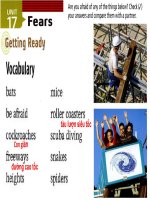Unit 8 landr kho tài liệu học tiếng anh
Bạn đang xem bản rút gọn của tài liệu. Xem và tải ngay bản đầy đủ của tài liệu tại đây (13.3 MB, 10 trang )
Unit 8 – L and R Sounds
Hi, this is AJ and welcome to Unit 8. Now the two sounds we're learning in this unit are very
difficult for many people, especially, uh, many people from Asian countries. Japanese people for
example I know have difficulty with these two sounds, R and L, R and L. They're very important
sounds in the English language. You need to pronounce them correctly so they sound different.
Let's start with L, L, okay, (laughs) the L sound. Now the L sound has an open mouth. Okay,
we're going to start with an L at the beginning of a word. Okay, and your jaw, this is your jaw,
this area of your mouth is called the jaw. It's the part you use to bite, right?
Your jaw's going to be down. La, la, la, la, la, la, la, la. So you're not, your mouth is not closed,
mmm, it's open and it's kind of relaxed. You kind of relax it when you make an L sound. And
then your tongue, your tongue is going to go up. It's going to touch the back of your top teeth so
it's hard for you to see but it's going to go up and touch these teeth up here, the back of your top
teeth, not bottom, top, top.
Can you see that? My tongue is up. La. La, la, la, la, la, la, la, la, la, la, la, la, la, la, la, la, la, la,
la, la, la, la, la, la, la, la, la, la, la.
Okay, so again jaw and mouth open and relaxed and the tongue goes behind your top teeth. La,
you make the sounds, right, mmm and then you just drop it, la.
Now when you make the L sound don't close your mouth. Keep your mouth open. Really your
mouth, your jaw does nothing. Your jaw just stays open. It's all happening from your tongue.
La, la, la, la, la, la, la, la, la, la, la, la, la, la, la, la.
I need to sing that L sound again and again and all I'm doing is moving my tongue to my teeth,
touching my teeth and then I drop it and back to my teeth, drop it.
La, la, la, la, la, la, la, la, la, la, la, la, la, la, la, la, la, la, la, la, la, la, la, la.
The mouth moving a little bit but almost nothing.
La, la, la, la, la, la.
Let's practice some words.
Large, large, large.
So the L starts the tongue is touching the top teeth and then just drops and then you say the rest
of the word.
Large, large, large. From the side, large, large.
Laugh, ha, ha, ha, ha, ha, laugh, laugh, laugh.
Language, language, language.
That's good.
Learn, learn, learn, learn.
Very good.
Luck, luck, luck.
Here's one that's difficult. It's got an L beginning and the end.
Loyal, loyal, loyal, loyal, loyal.
Let's talk a little more about the L at the end of a word because the action is kind of backwards.
When the L's at the end your tongue will go up and at the end so you'll go loyal, loyal.
The final L sound, your tongue goes up and touches your teeth, the back of your front teeth, your
top teeth, and that's at the end. It'll just, it'll go up as you make the sound and it will stay there so
loyal.
So the word skill, skill. See my tongue finishes in that position touching the tongue if it's at the
end of a word.
Skill, skill, skill, skill.
I will. I will do it. Will, will, will, will, will.
Here's one, I will if we push it together to make a mash up, a, a short word,
I'll, I'll, I'll. The L's at the end.
I'll, I'll, I'll do it. I'll, I'll, I'll.
All right very good.
Now the R sound, how is the R different? Some people can't hear the difference or can't make the
difference so let me teach you how to do the R and how it's different than L. Now first difference
with R, is that this will help you say it more correctly, is that you can naturally push your cheeks
... These are your cheeks right here, sides of your face.
You can push your cheeks and your lips and your mouth forward a little bit on the R. Now in real
speech it's very small. It just kind of tightens a little bit. It gets a little tighter but when we
practice we're going to do it a little bit bigger than normal. We're going to exaggerate. So that's
the first thing. You kind of make that little fish face (laughs) with the R. That might help you
make it more correctly.
Now another big difference, the biggest difference, is the tongue position. And remember the L,
the L the tongue is touching the teeth but in the R the tongue goes back, the front of the tongue,
the tip. It curls up and back. It goes up and back for the R, rrr.
You can't see it because it's now it's back in the middle of my mouth but it's curling up, curling
and going up. The throat goes mmmp, like that, mmmp, rrr.
And then the final part vibration again. The tongue, especially the front of the tongue, vibrates,
shakes, also your throat will vibrate. And for a, a good R make it strong, strong vibration.
So the three parts again. Push your face forward a little bit like that, you're kissing. Tongue curls
up and back, right, up towards the top of your mouth and backwards. And then your tongue
vibrates. It shakes and so does your throat.
Rrr, rrr, rrr, rrr, rrr, that's the R.
Let's practice some words with R. Make that vibration very, very strong. Now if you're a Spanish
speaker or Italian, this is going to be really easy for you, but if you're Japanese, this might be
very tough. Let's do it.
Raise, raise, lift up, raise, that strong vibration, raise.
Your tongue is shaking inside your mouth and it's also back and up.
Raise, raise.
Red, red, red.
Here's one that has two in it. Rare means it's not usual, rare. R at the beginning and at the end.
Rare, rare, rare, rare, rare. Good.
Royal, royal. R at the beginning, L at the end. Royal just means like a king or queen.
Royal, royal, royal, royal, rrr.
Get that vibration.
Royal, royal, royal, royal.
Result, result, result, result.
Ready, ready, ready.
Okay the final note about both R and L at the end of words, when they are at the end of words,
you need to pronounce them very, (clap sound) very, strongly. So again if an R is at the end of a
word, make the vibration extra strong, make it a little slower, a little big longer because the big
problem that a lot of speakers have, especially speakers from some countries in Asia, is that they
cut the R's at the end of words or they cut the L's.
So, uh, the word rare for example they'll say, "rer, rer, rer, rer," and the final R is, is weak and
people can't understand it. So the final R, the R's at the end of a word, have to be very strong,
rare, er, er, er.
Americans love this R sound and they love it at the end of words too. It's got to be strong, rare,
rare, or even in the middle, very, right, it's not vary, it's very. That R in very is super important,
very, make it strong.
Same with words with L's at the end. Make the L's strong. If you're putting like I will, will, don't
say wi, wi, wi, wi. That's too weak. Make the L very strong, will, la, la, la, la, la, will. (clap
sound) okay, don't worry because we're going to practice these words a lot.
Let's do a couple with the R at the end and then in the training you're going to be practicing lots
and lots, okay? Just a few with the R at the end.
Fire, fire, right?
Fire, fire. Strong R at the end. Fire, fire.
Better, better, better, better.
Future, future, future, future, rrr, future.
All right, you're ready for the training. Training is where you will really practice this and
improve your pronunciation of both R and L.
And by the way for some speakers, like again I mentioned, uh, people from Spanish speaking
countries, Italian, you might actually need to make your R's a little softer because some Spanish
speakers, for example, will make that super strong R, rrr, rrr.
We don't do that in English. If you do it too strong, rrrah, right, very, it sounds strange. You want
... So if you're from (laughs) a Spanish speaking country or then actually soften your R's, a little
less vibration might be best. So you have to listen carefully so you can adjust so that your
vibration is the same as mine.
See you in the training audio.
Unit 8 – Practice Session
Time for the training audio. Lots of energy! Follow the five day method. Let's start now.
I'll reach my long term goal for the future by following the powerful, effortless language training
plan. I program my brain like a computer to receive really powerful results faster. I love regular
training and practice. I'll be loyal to the system of regular daily learning until I reach the level I
want.
I resolve to work smarter not harder. I resolve to control my feelings while focusing on powerful,
positive goals. I laugh whenever I make a mistake. I understand that perfection is impossible, but
I'll constantly improve.
I'll constantly grow, learn, and raise my level. I'm always getting better, smarter, happier, and
more skillful. This is the power of regular training. I love this training because I'll certainly
acquire the English skill I require for success.
Now, at a medium speed.
I'll reach my long term goal for the future by following the powerful, effortless language training
plan. I program my brain like a computer to receive really powerful results faster. I love regular
training and practice. I'll be loyal to the system of regular daily learning until I reach the level I
want.
I resolve to work smarter not harder. I resolve to control my feelings while focusing on powerful,
positive goals. I laugh whenever I make a mistake. I understand that perfection is impossible, but
I'll constantly improve.
I'll constantly grow, learn, and raise my level. I'm always getting better, smarter, happier, and
more skillful. This is the power of regular training. I love this training because I'll certainly
acquire the English skill I require for success.
Now, a littler faster.
I'll reach my long term goal for the future by following the powerful effortless language training
plan. I program my brain like a computer to receive really powerful results faster. I love regular
training and practice. I'll be loyal to the system of regular daily learning until I reach the level I
want.
I resolve to work smarter not harder. I resolve to control my feelings while focusing on powerful,
positive goals. I laugh whenever I make a mistake. I understand that perfection is impossible, but
I'll constantly improve.
I'll constantly grow, learn, and raise my level. I'll always be getting better, smarter, happier, and
more skillful. This is the power of regular training. I love this training because I'll certainly
acquire the English skill I require for success.
Unit 8
Page 2 of 2
CLICK HERE









